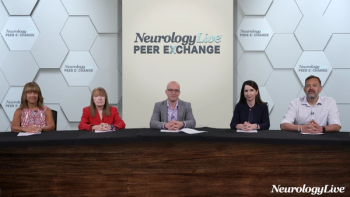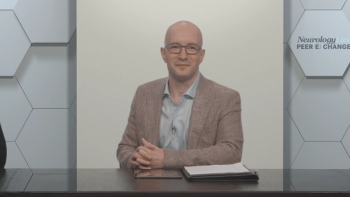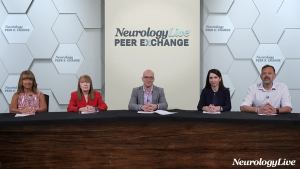Articles by Heidi Crayton, MD

Conversations With Patients About Mild/Moderate Multiple Sclerosis
ByStephen Krieger, MD,Heidi Crayton, MD,Jacqueline Nicholas, MD, MPH,Patricia K. Coyle, MD,Enrique Alvarez, MD, PhD The expert panel examines early multiple sclerosis (MS) and patients with mild MS even in later stages of the disease, emphasizing crucial information to convey to patients throughout their journey; faculty also explore cases where disease-modifying therapies (DMTs) may not be utilized.

Mild/Moderate Multiple Sclerosis in Patients of Different Races and Ethnicities
ByStephen Krieger, MD,Heidi Crayton, MD,Jacqueline Nicholas, MD, MPH,Patricia K. Coyle, MD,Enrique Alvarez, MD, PhD Multiple sclerosis (MS) specialists discuss their observations regarding variations in MS presentation and progression among patients of Different Races and Ethnicities

Defining Mild Multiple Sclerosis
ByStephen Krieger, MD,Heidi Crayton, MD,Jacqueline Nicholas, MD, MPH,Patricia K. Coyle, MD,Enrique Alvarez, MD, PhD The panelists explore diagnostic methods for differentiating between mild and moderate multiple sclerosis (MS) while also examining prognostic factors, the role of imaging, and the concept of brain reserve in mild MS cases.

Presentation of Clinically Isolated Syndrome/First Attack of Multiple Sclerosis
ByStephen Krieger, MD,Heidi Crayton, MD,Jacqueline Nicholas, MD, MPH,Patricia K. Coyle, MD,Enrique Alvarez, MD, PhD Key opinion leaders provide insights into the prevalence and incidence of clinically isolated syndrome (CIS) within their clinical practice.

Key Points for the Management of Multiple Sclerosis
ByStephen Krieger, MD,Daniel Bandari, MD, MS,Bruce Hughes, MD,Mitzi Williams, MD,Heidi Crayton, MD Stephen Krieger, MD; Daniel Bandari, MD, MS; Bruce Hughes, MD; Mitzi Williams, MD; and Heidi Crayton, MD, provide key takeaways for the treatment of patients with multiple sclerosis.

Updates on Vaccine Efficacy in Multiple Sclerosis
ByStephen Krieger, MD,Daniel Bandari, MD, MS,Bruce Hughes, MD,Mitzi Williams, MD,Heidi Crayton, MD A panel of experts discuss COVID-19 vaccine efficacy for patients undergoing treatment for multiple sclerosis.

Discontinuation of Treatment for Pregnancy in Multiple Sclerosis
ByStephen Krieger, MD,Daniel Bandari, MD, MS,Bruce Hughes, MD,Mitzi Williams, MD,Heidi Crayton, MD An expert panel considers patients with multiple sclerosis who may need to discontinue treatment during pregnancy.

Treatment Interruption and Cessation for Multiple Sclerosis
ByStephen Krieger, MD,Daniel Bandari, MD, MS,Bruce Hughes, MD,Mitzi Williams, MD,Heidi Crayton, MD Stephen Krieger, MD; Daniel Bandari, MD, MS; Bruce Hughes, MD; Mitzi Williams, MD; and Heidi Crayton, MD, review data on short-term interruption of ponesimod vs teriflunomide when treating multiple sclerosis.

Switching Therapies for Patients with Multiple Sclerosis
ByStephen Krieger, MD,Daniel Bandari, MD, MS,Bruce Hughes, MD,Mitzi Williams, MD,Heidi Crayton, MD Stephen Krieger, MD; Daniel Bandari, MD, MS; Bruce Hughes, MD; Mitzi Williams, MD; and Heidi Crayton, MD, discuss their approach to switching treatments for patients with multiple sclerosis and the timing between therapies.

Sequencing Disease-Modifying Therapies in Multiple Sclerosis
ByStephen Krieger, MD,Daniel Bandari, MD, MS,Bruce Hughes, MD,Mitzi Williams, MD,Heidi Crayton, MD Stephen Krieger, MD; Daniel Bandari, MD, MS; Bruce Hughes, MD; Mitzi Williams, MD; and Heidi Crayton, MD, share their thoughts on sequencing disease-modifying therapies when treating patients with multiple sclerosis.

Long-Term Safety of S1P Receptor Modulators in Multiple Sclerosis
ByStephen Krieger, MD,Daniel Bandari, MD, MS,Bruce Hughes, MD,Mitzi Williams, MD,Heidi Crayton, MD Stephen Krieger, MD; Daniel Bandari, MD, MS; Bruce Hughes, MD; Mitzi Williams, MD; and Heidi Crayton, MD, examine the safety of sphingosine 1-phosphate receptor modulators for the treatment of multiple sclerosis.

Brain Health in Multiple Sclerosis
ByStephen Krieger, MD,Daniel Bandari, MD, MS,Bruce Hughes, MD,Mitzi Williams, MD,Heidi Crayton, MD An expert panel talks about the preservation of brain health regarding the use of sphingosine 1-phosphate receptor modulators to treat multiple sclerosis.

S1P Receptor Modulator Treatment in Female Patients with MS
ByStephen Krieger, MD,Daniel Bandari, MD, MS,Bruce Hughes, MD,Mitzi Williams, MD,Heidi Crayton, MD Stephen Krieger, MD; Daniel Bandari, MD, MS; Bruce Hughes, MD; Mitzi Williams, MD; and Heidi Crayton, MD, review data on ponesimod vs teriflunomide for the treatment of female patients with multiple sclerosis who are of childbearing age.

Overview of Sphingosine 1-Phosphate (S1P) Receptor Modulators
ByStephen Krieger, MD,Daniel Bandari, MD, MS,Bruce Hughes, MD,Mitzi Williams, MD,Heidi Crayton, MD An expert panel provides an overview of sphingosine-1-phosphate receptor modulators and their use in the treatment of multiple sclerosis.

Differences Between MS Patient Characteristics in Clinical Trials and Real-World Populations
ByStephen Krieger, MD,Daniel Bandari, MD, MS,Bruce Hughes, MD,Mitzi Williams, MD,Heidi Crayton, MD Stephen Krieger, MD; Daniel Bandari, MD, MS; Bruce Hughes, MD; Mitzi Williams, MD; and Heidi Crayton, MD, review the OPTIMISE study and reflect on the differences between patient characteristics in clinical trial settings vs clinical practice.

Comorbidities in Patients With Multiple Sclerosis (MS)
ByStephen Krieger, MD,Daniel Bandari, MD, MS,Bruce Hughes, MD,Mitzi Williams, MD,Heidi Crayton, MD Stephen Krieger, MD; Daniel Bandari, MD, MS; Bruce Hughes, MD; Mitzi Williams, MD; and Heidi Crayton, MD, discuss the prevalence of comorbidities in patients with multiple sclerosis.

Experts in neurology share practice pearls to optimize the treatment for patients with multiple sclerosis.

Heidi Crayton, MD; Jacqueline Nicholas, MD; and Flavia Nelson, MD, share their excitement for the future of multiple sclerosis treatment and comment on emerging therapies.

Experts in neurology provide insight into treatment selection and sequencing in patients with multiple sclerosis, focusing on S1P modulators.

Dr Jacqueline Nicholas hypothesizes about the utility of neurofilaments as a biomarker of disease severity in patients with multiple sclerosis.

Heidi Crayton, MD, and Jacqueline Nicholas, MD, review the importance of long-term safety data in the management of patients with multiple sclerosis, and Flavia Nelson, MD, discusses her approach to counseling patients on the safety considerations regarding new S1P modulating agents.

Dr Flavia Nelson comments on the impact of S1P modulators on brain volume measures; highlighting thalamic atrophy and its correlation with brain volume loss in MS.

Experts in neurology review data surrounding the role of disease-modifying therapies in preventing grey matter brain atrophy and cognitive decline.

Dr Heidi Crayton discusses the role of S1P receptor modulators in the management of patient with multiple sclerosis.

Flavia Nelson, MD, provides an overview of available brain atrophy data and cognition research in patients with multiple sclerosis.

Heidi Crayton, MD, expresses her optimism for the future of multiple sclerosis and highlights emerging therapies and their impact on the care of patients with multiple sclerosis.

Dr Heidi Crayton reviews the potential impact of vaccinations on immunosuppressive disease-modifying therapy efficacy in patients with multiple sclerosis.

Jacqueline Nicholas, MD, provides insight into challenges inherent to the assessment of brain health in patients with multiple sclerosis [MS].

Heidi Crayton, MD, shares a patient story to highlight the importance of imaging modalities in identifying brain loss and atrophy in patients with multiple sclerosis [MS].

Heidi Crayton, MD, comments on cognitive and brain health considerations in patients with multiple sclerosis and shares her experiences with both patients and their caregivers.












